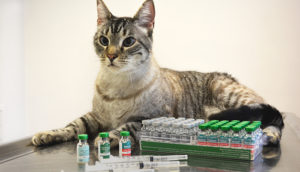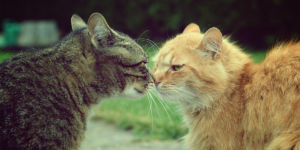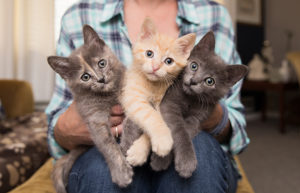A vaccine is a medical product that stimulates an animal’s immune system to produce antibodies (also known as immunity) to a specific disease, protecting the animal from that disease or lessening its severity if he/she were to ever be exposed to it during their lifetime. Vaccines are typically administered through needle injections, although can also be given by mouth or into the nose. Immunization plays a very important role in controlling infectious illness from spreading throughout young and adult feline populations while concurrently increasing the wellbeing and health of pets.
There are 2 different categories that vaccines fall into: core and non-core vaccines (also known as lifestyle vaccines). Both of these categories will be discussed in more detail below.
Core Vaccines:
Core vaccines are recommended to all kittens and adult felines by the American Animal Hospital Association (AAHA). They are considered vital to the health and wellbeing of all pets to prevent diseases with a high mortality/morbidity rate.
Core vaccines protect against:
- Feline Viral Rhinotracheitis
- Calicivirus
- Panleukopenia
- 1 vaccine (FVRCP vaccine – which stands for Feline Viral Rhinotracheitis, Calicivirus and Panleukopenia) is used to protect against the 3 above stated upper respiratory infections
- Rabies Virus

Non-Core Vaccines:
Non-core vaccines are recommended based on the lifestyle of each individual cat and the risk factors they will be potentially exposed to.
Non-core vaccines protect against:
- Feline Leukemia
This vaccine is highly recommended for felines that have access to the outdoors. Feline leukemia is a virus easily spread through the saliva of infected cats and less commonly through urine and feces. This virus is typically known as a disease of “friendly cats” as it is primarily transmitted via the saliva during mutual grooming or mating, and to a lesser extent from sharing litter boxes, food and water bowls. This virus is not highly contagious and typically requires frequent/prolonged contact from an infected cat. Cat bites will also readily transmit infection along with infected mothers who may pass along the virus to kittens in the womb or soon after birth when she grooms them. Feline leukemia is the second leading cause of death in cats behind trauma incidents, although about 30% of cats who do contract the virus are able to build resistance to the virus or fight it off – others will develop a persistent lifelong infection.
A common misconception is that feline leukemia is an automatic death sentence. In fact, some cats will not show symptoms for many years after contraction and can still have the opportunity to live long and happy lives if diagnosed as an adult. Cats who are infected do not usually die from the virus itself, but usually succumb to a separate illness due to the immune suppression that the Feline Leukemia virus causes. There is no current treatment for Feline Leukemia – vaccination + preventative measures are the best way to prevent the spread of the virus; this would include keeping cats indoors and preventing roaming behaviour. All cats with an unknown history should be tested for feline leukemia before receiving vaccination. Due to the nature of this virus it is recommended that cats who are positive for feline leukemia only live with other cats who are also positive for the virus.

When should kitten vaccines be given?
Kitten vaccines are typically recommended to begin around 8 weeks of age – this is usually the time period in which most kittens are adopted.
Prior to vaccines being given, kittens are generally protected from disease through antibodies they would have received in their mother’s milk (colostrum) while they were nursing. The reason vaccines are begun around 8 weeks of age is because this is the time period in which the effects of those maternal antibodies wear off and continued immunity needs to be achieved through the use of vaccination.
Some kitten vaccines will be required to be boostered 2 or 3 times in order for them to display their full efficacy. Keep in mind that all vaccine schedules may vary from animal to animal based on different factors that will be considered and discussed with your veterinarian at your kitten’s first appointment. A general kitten vaccine series is outlined below based on the kitten’s age:
8 weeks:
- FVRCP (Feline Viral Rhinotracheitis, Calicivirus, Panleukopenia)
12 weeks:
- FVRCP (Feline Viral Rhinotracheitis, Calicivirus, Panleukopenia)
- FeLV (Feline Leukemia Virus) for at risk felines
16 weeks:
- FVRCP (Feline Viral Rhinotracheitis, Calicivirus, Panleukopenia)
- FeLV (Feline Leukemia Virus) for at risk felines
- Rabies Virus
Most vaccines will be good for one year after receiving the final dose of each above listed vaccine.

Do adult felines need to receive vaccines as well?
Yes! Adult’s cats are recommended to receive vaccinations as well. It is suggested that every adult cat is examined by a veterinarian at least once annually to assess their general health status – this is usually a perfect time to complete your cat’s vaccines as well! Most vaccines are required to be completed annually in order for them to display full efficacy.
Some vaccines may be valid for up to 3 years once your cat is an adult.

Vaccines reactions
The benefits of vaccines typically outweigh the risks of not vaccinating. Adverse reactions to vaccines are not very common although still may occur and it is important to be aware of them and be present to be able to monitor your cat at home after he/she has received his/her vaccine(s). Normal/mild symptoms may be noted after vaccination just as they can be with humans and will resolve within 12-48 hours after vaccination. These symptoms may include tenderness around the area of injection or discomfort, mild lethargy/fatigue.
Serious vaccine reactions may include the following:
- Vomiting
- Diarrhea
- Facial swelling/hives
- Difficulty breathing
- Excessive lethargy/fatigue
- Decreased appetite
- Small red, raised, itchy bumps on the body (hives)
- Persistent or severe coughing
If you are ever concerned that your pet may be having a vaccine reaction please phone the clinic immediately (519-893-8937) or the nearest emergency veterinary clinic for advice. The nearest emergency veterinary clinic in the Kitchener-Waterloo area is the Emergency Veterinary Clinic of Waterloo Region (519-650-1617).
If you would like to know more information, or schedule your new kitten/cat in for a fear free examination and vaccines with one of our friendly veterinarians, please give us a call today at 519-893-8937 – One of our approachable staff members would be more than happy to assist you!


